International Business, Trade Practices, and BP's Strategy Essay
VerifiedAdded on 2019/12/03
|9
|3939
|311
Essay
AI Summary
This essay delves into the realm of international business, exploring the intricacies of export and import operations within multinational enterprises, with a specific focus on British Petroleum (BP). It begins by defining international business and its significance in the global market, highlighting the role of multinational enterprises in facilitating trade and investment across borders. The essay then examines the importance of trade practices, including the export and import of goods and services, and their impact on BP's strategic goals. It analyzes the advantages and disadvantages of both export and import for BP, considering factors such as technological transfer, employment generation, financial investments, and competitive advantages. Furthermore, the essay explores the corporate strategy of BP in relation to its export and import transactions, emphasizing how these practices contribute to the company's global expansion and market positioning. Overall, the essay provides a comprehensive overview of international business operations and their implications for multinational enterprises like BP.
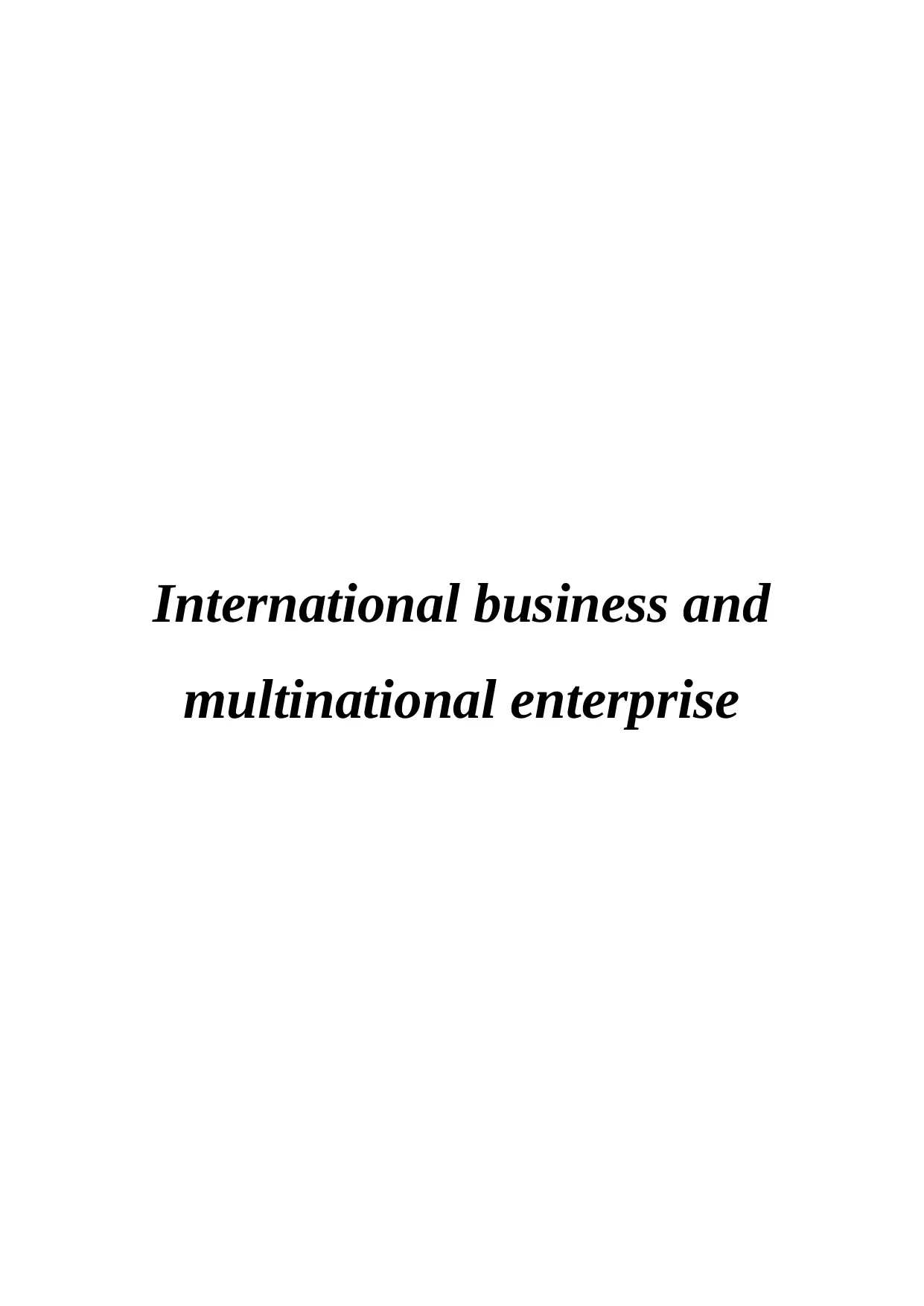
International business and
multinational enterprise
multinational enterprise
Paraphrase This Document
Need a fresh take? Get an instant paraphrase of this document with our AI Paraphraser
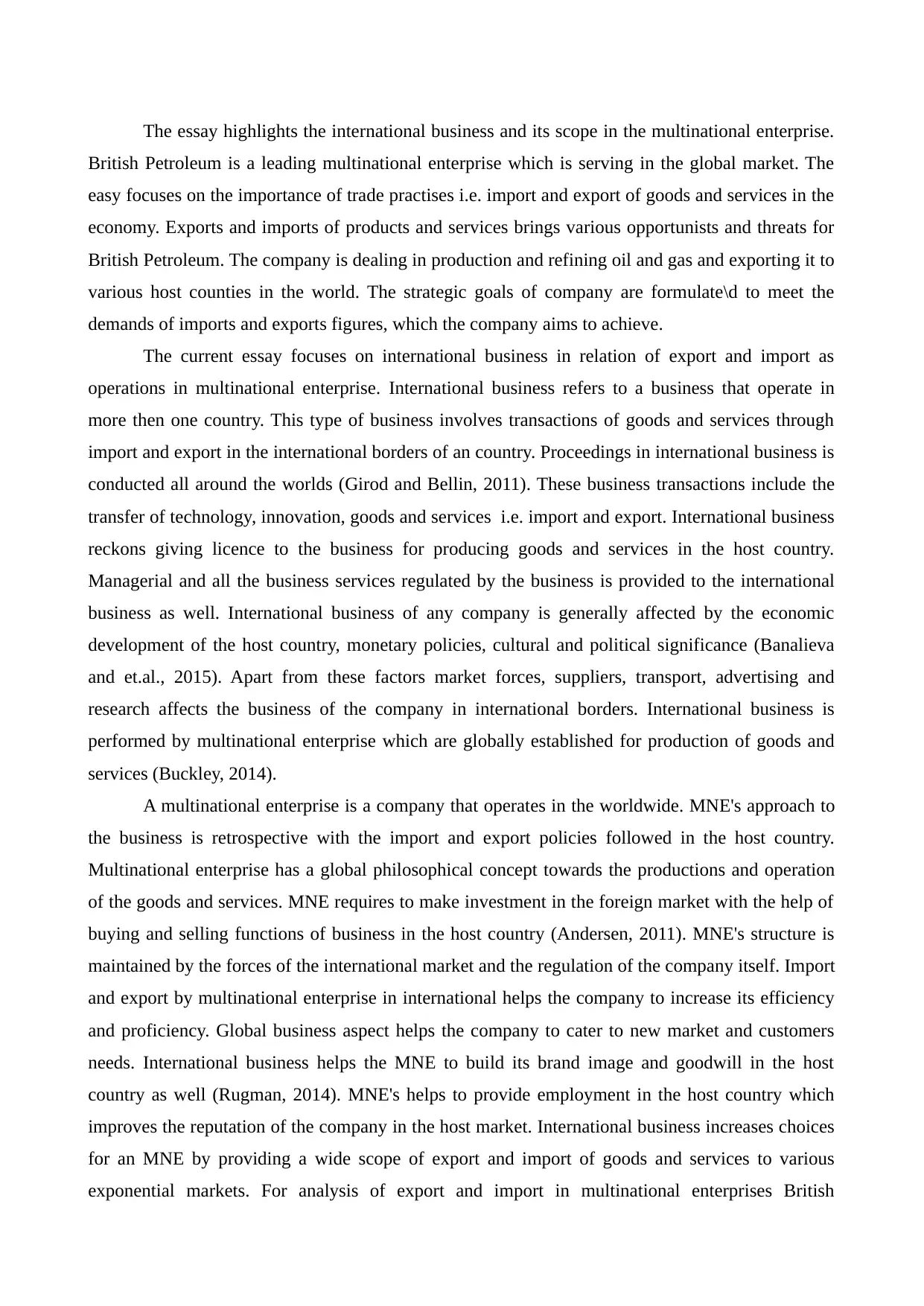
The essay highlights the international business and its scope in the multinational enterprise.
British Petroleum is a leading multinational enterprise which is serving in the global market. The
easy focuses on the importance of trade practises i.e. import and export of goods and services in the
economy. Exports and imports of products and services brings various opportunists and threats for
British Petroleum. The company is dealing in production and refining oil and gas and exporting it to
various host counties in the world. The strategic goals of company are formulate\d to meet the
demands of imports and exports figures, which the company aims to achieve.
The current essay focuses on international business in relation of export and import as
operations in multinational enterprise. International business refers to a business that operate in
more then one country. This type of business involves transactions of goods and services through
import and export in the international borders of an country. Proceedings in international business is
conducted all around the worlds (Girod and Bellin, 2011). These business transactions include the
transfer of technology, innovation, goods and services i.e. import and export. International business
reckons giving licence to the business for producing goods and services in the host country.
Managerial and all the business services regulated by the business is provided to the international
business as well. International business of any company is generally affected by the economic
development of the host country, monetary policies, cultural and political significance (Banalieva
and et.al., 2015). Apart from these factors market forces, suppliers, transport, advertising and
research affects the business of the company in international borders. International business is
performed by multinational enterprise which are globally established for production of goods and
services (Buckley, 2014).
A multinational enterprise is a company that operates in the worldwide. MNE's approach to
the business is retrospective with the import and export policies followed in the host country.
Multinational enterprise has a global philosophical concept towards the productions and operation
of the goods and services. MNE requires to make investment in the foreign market with the help of
buying and selling functions of business in the host country (Andersen, 2011). MNE's structure is
maintained by the forces of the international market and the regulation of the company itself. Import
and export by multinational enterprise in international helps the company to increase its efficiency
and proficiency. Global business aspect helps the company to cater to new market and customers
needs. International business helps the MNE to build its brand image and goodwill in the host
country as well (Rugman, 2014). MNE's helps to provide employment in the host country which
improves the reputation of the company in the host market. International business increases choices
for an MNE by providing a wide scope of export and import of goods and services to various
exponential markets. For analysis of export and import in multinational enterprises British
British Petroleum is a leading multinational enterprise which is serving in the global market. The
easy focuses on the importance of trade practises i.e. import and export of goods and services in the
economy. Exports and imports of products and services brings various opportunists and threats for
British Petroleum. The company is dealing in production and refining oil and gas and exporting it to
various host counties in the world. The strategic goals of company are formulate\d to meet the
demands of imports and exports figures, which the company aims to achieve.
The current essay focuses on international business in relation of export and import as
operations in multinational enterprise. International business refers to a business that operate in
more then one country. This type of business involves transactions of goods and services through
import and export in the international borders of an country. Proceedings in international business is
conducted all around the worlds (Girod and Bellin, 2011). These business transactions include the
transfer of technology, innovation, goods and services i.e. import and export. International business
reckons giving licence to the business for producing goods and services in the host country.
Managerial and all the business services regulated by the business is provided to the international
business as well. International business of any company is generally affected by the economic
development of the host country, monetary policies, cultural and political significance (Banalieva
and et.al., 2015). Apart from these factors market forces, suppliers, transport, advertising and
research affects the business of the company in international borders. International business is
performed by multinational enterprise which are globally established for production of goods and
services (Buckley, 2014).
A multinational enterprise is a company that operates in the worldwide. MNE's approach to
the business is retrospective with the import and export policies followed in the host country.
Multinational enterprise has a global philosophical concept towards the productions and operation
of the goods and services. MNE requires to make investment in the foreign market with the help of
buying and selling functions of business in the host country (Andersen, 2011). MNE's structure is
maintained by the forces of the international market and the regulation of the company itself. Import
and export by multinational enterprise in international helps the company to increase its efficiency
and proficiency. Global business aspect helps the company to cater to new market and customers
needs. International business helps the MNE to build its brand image and goodwill in the host
country as well (Rugman, 2014). MNE's helps to provide employment in the host country which
improves the reputation of the company in the host market. International business increases choices
for an MNE by providing a wide scope of export and import of goods and services to various
exponential markets. For analysis of export and import in multinational enterprises British
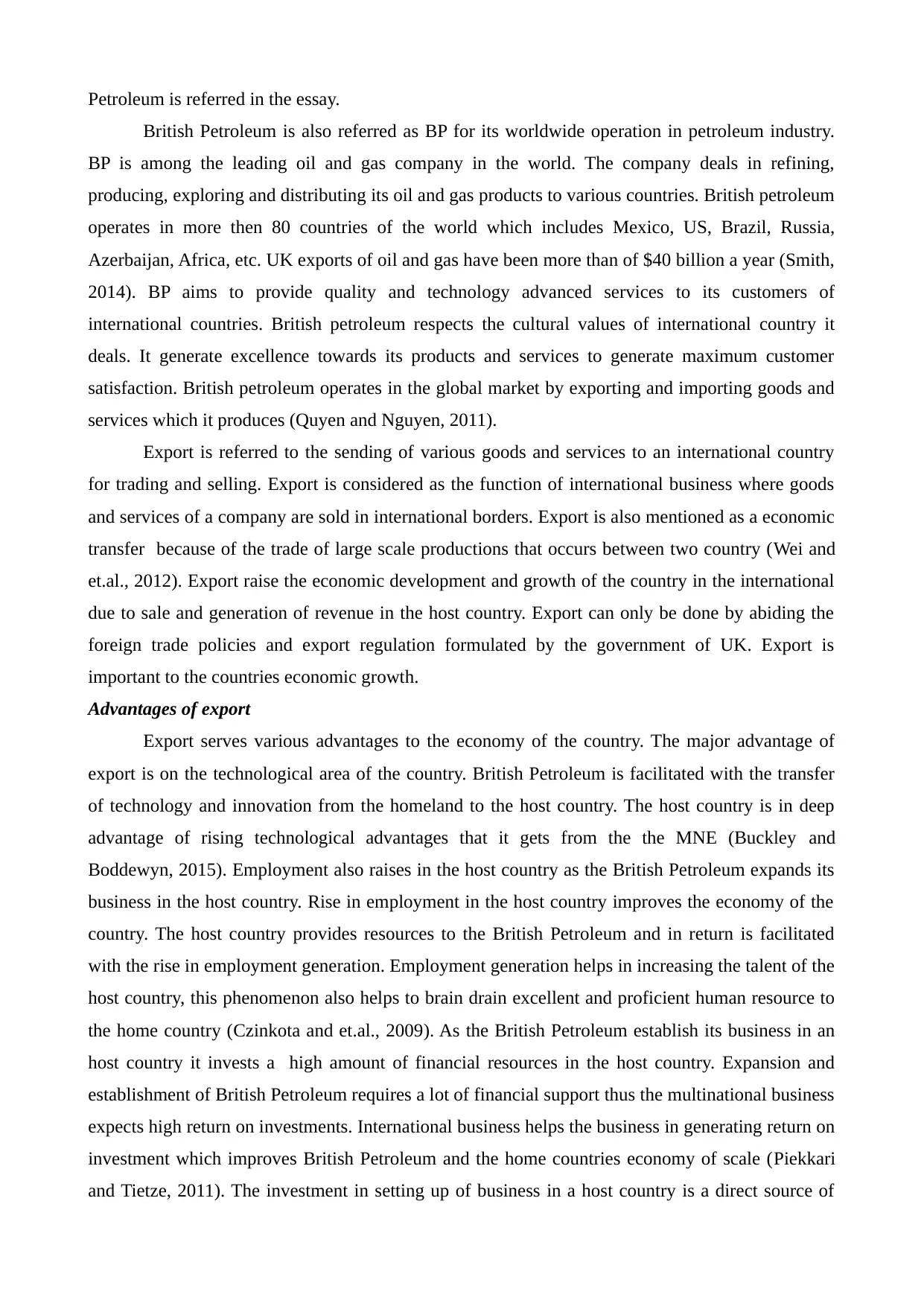
Petroleum is referred in the essay.
British Petroleum is also referred as BP for its worldwide operation in petroleum industry.
BP is among the leading oil and gas company in the world. The company deals in refining,
producing, exploring and distributing its oil and gas products to various countries. British petroleum
operates in more then 80 countries of the world which includes Mexico, US, Brazil, Russia,
Azerbaijan, Africa, etc. UK exports of oil and gas have been more than of $40 billion a year (Smith,
2014). BP aims to provide quality and technology advanced services to its customers of
international countries. British petroleum respects the cultural values of international country it
deals. It generate excellence towards its products and services to generate maximum customer
satisfaction. British petroleum operates in the global market by exporting and importing goods and
services which it produces (Quyen and Nguyen, 2011).
Export is referred to the sending of various goods and services to an international country
for trading and selling. Export is considered as the function of international business where goods
and services of a company are sold in international borders. Export is also mentioned as a economic
transfer because of the trade of large scale productions that occurs between two country (Wei and
et.al., 2012). Export raise the economic development and growth of the country in the international
due to sale and generation of revenue in the host country. Export can only be done by abiding the
foreign trade policies and export regulation formulated by the government of UK. Export is
important to the countries economic growth.
Advantages of export
Export serves various advantages to the economy of the country. The major advantage of
export is on the technological area of the country. British Petroleum is facilitated with the transfer
of technology and innovation from the homeland to the host country. The host country is in deep
advantage of rising technological advantages that it gets from the the MNE (Buckley and
Boddewyn, 2015). Employment also raises in the host country as the British Petroleum expands its
business in the host country. Rise in employment in the host country improves the economy of the
country. The host country provides resources to the British Petroleum and in return is facilitated
with the rise in employment generation. Employment generation helps in increasing the talent of the
host country, this phenomenon also helps to brain drain excellent and proficient human resource to
the home country (Czinkota and et.al., 2009). As the British Petroleum establish its business in an
host country it invests a high amount of financial resources in the host country. Expansion and
establishment of British Petroleum requires a lot of financial support thus the multinational business
expects high return on investments. International business helps the business in generating return on
investment which improves British Petroleum and the home countries economy of scale (Piekkari
and Tietze, 2011). The investment in setting up of business in a host country is a direct source of
British Petroleum is also referred as BP for its worldwide operation in petroleum industry.
BP is among the leading oil and gas company in the world. The company deals in refining,
producing, exploring and distributing its oil and gas products to various countries. British petroleum
operates in more then 80 countries of the world which includes Mexico, US, Brazil, Russia,
Azerbaijan, Africa, etc. UK exports of oil and gas have been more than of $40 billion a year (Smith,
2014). BP aims to provide quality and technology advanced services to its customers of
international countries. British petroleum respects the cultural values of international country it
deals. It generate excellence towards its products and services to generate maximum customer
satisfaction. British petroleum operates in the global market by exporting and importing goods and
services which it produces (Quyen and Nguyen, 2011).
Export is referred to the sending of various goods and services to an international country
for trading and selling. Export is considered as the function of international business where goods
and services of a company are sold in international borders. Export is also mentioned as a economic
transfer because of the trade of large scale productions that occurs between two country (Wei and
et.al., 2012). Export raise the economic development and growth of the country in the international
due to sale and generation of revenue in the host country. Export can only be done by abiding the
foreign trade policies and export regulation formulated by the government of UK. Export is
important to the countries economic growth.
Advantages of export
Export serves various advantages to the economy of the country. The major advantage of
export is on the technological area of the country. British Petroleum is facilitated with the transfer
of technology and innovation from the homeland to the host country. The host country is in deep
advantage of rising technological advantages that it gets from the the MNE (Buckley and
Boddewyn, 2015). Employment also raises in the host country as the British Petroleum expands its
business in the host country. Rise in employment in the host country improves the economy of the
country. The host country provides resources to the British Petroleum and in return is facilitated
with the rise in employment generation. Employment generation helps in increasing the talent of the
host country, this phenomenon also helps to brain drain excellent and proficient human resource to
the home country (Czinkota and et.al., 2009). As the British Petroleum establish its business in an
host country it invests a high amount of financial resources in the host country. Expansion and
establishment of British Petroleum requires a lot of financial support thus the multinational business
expects high return on investments. International business helps the business in generating return on
investment which improves British Petroleum and the home countries economy of scale (Piekkari
and Tietze, 2011). The investment in setting up of business in a host country is a direct source of
⊘ This is a preview!⊘
Do you want full access?
Subscribe today to unlock all pages.

Trusted by 1+ million students worldwide
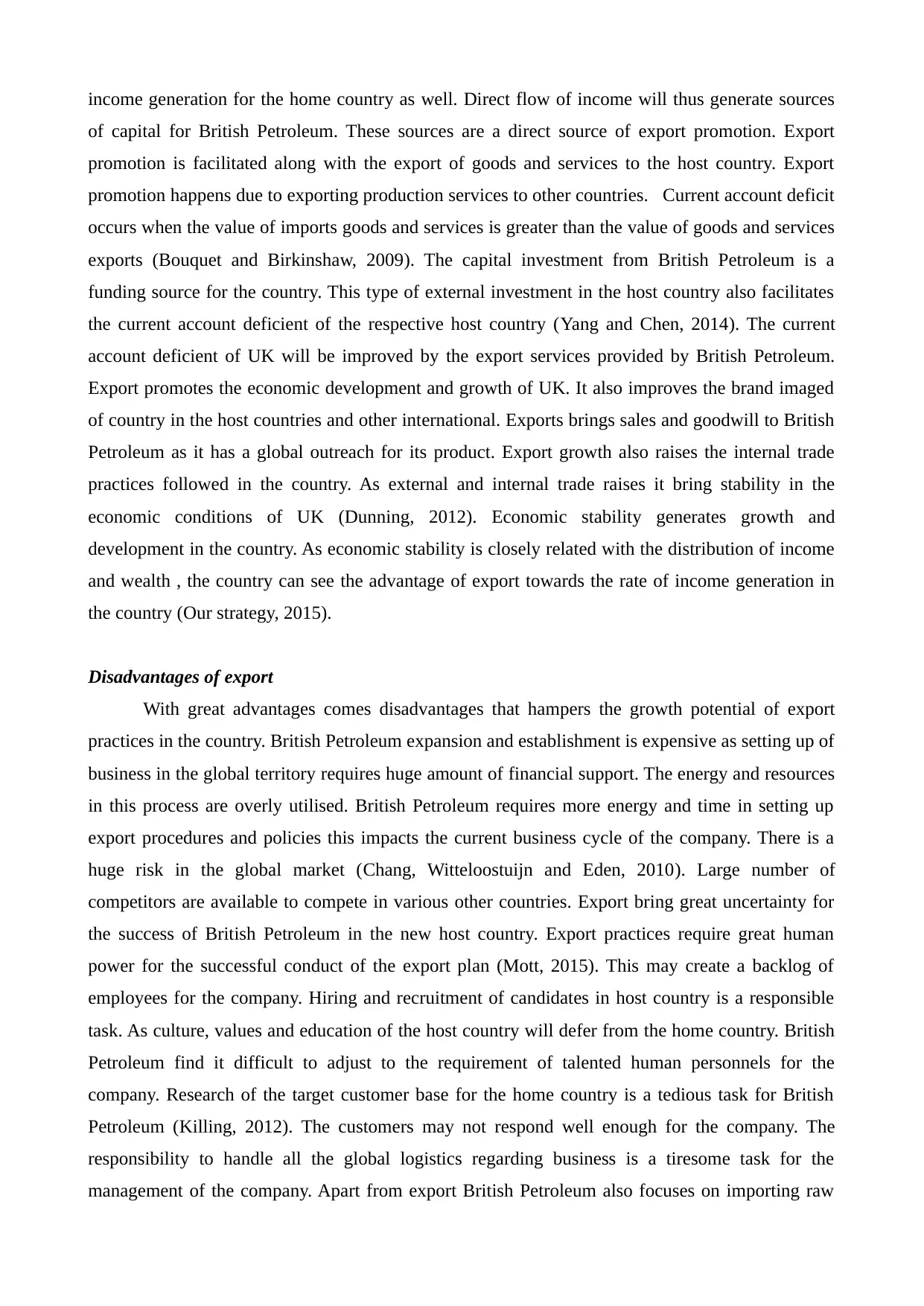
income generation for the home country as well. Direct flow of income will thus generate sources
of capital for British Petroleum. These sources are a direct source of export promotion. Export
promotion is facilitated along with the export of goods and services to the host country. Export
promotion happens due to exporting production services to other countries. Current account deficit
occurs when the value of imports goods and services is greater than the value of goods and services
exports (Bouquet and Birkinshaw, 2009). The capital investment from British Petroleum is a
funding source for the country. This type of external investment in the host country also facilitates
the current account deficient of the respective host country (Yang and Chen, 2014). The current
account deficient of UK will be improved by the export services provided by British Petroleum.
Export promotes the economic development and growth of UK. It also improves the brand imaged
of country in the host countries and other international. Exports brings sales and goodwill to British
Petroleum as it has a global outreach for its product. Export growth also raises the internal trade
practices followed in the country. As external and internal trade raises it bring stability in the
economic conditions of UK (Dunning, 2012). Economic stability generates growth and
development in the country. As economic stability is closely related with the distribution of income
and wealth , the country can see the advantage of export towards the rate of income generation in
the country (Our strategy, 2015).
Disadvantages of export
With great advantages comes disadvantages that hampers the growth potential of export
practices in the country. British Petroleum expansion and establishment is expensive as setting up of
business in the global territory requires huge amount of financial support. The energy and resources
in this process are overly utilised. British Petroleum requires more energy and time in setting up
export procedures and policies this impacts the current business cycle of the company. There is a
huge risk in the global market (Chang, Witteloostuijn and Eden, 2010). Large number of
competitors are available to compete in various other countries. Export bring great uncertainty for
the success of British Petroleum in the new host country. Export practices require great human
power for the successful conduct of the export plan (Mott, 2015). This may create a backlog of
employees for the company. Hiring and recruitment of candidates in host country is a responsible
task. As culture, values and education of the host country will defer from the home country. British
Petroleum find it difficult to adjust to the requirement of talented human personnels for the
company. Research of the target customer base for the home country is a tedious task for British
Petroleum (Killing, 2012). The customers may not respond well enough for the company. The
responsibility to handle all the global logistics regarding business is a tiresome task for the
management of the company. Apart from export British Petroleum also focuses on importing raw
of capital for British Petroleum. These sources are a direct source of export promotion. Export
promotion is facilitated along with the export of goods and services to the host country. Export
promotion happens due to exporting production services to other countries. Current account deficit
occurs when the value of imports goods and services is greater than the value of goods and services
exports (Bouquet and Birkinshaw, 2009). The capital investment from British Petroleum is a
funding source for the country. This type of external investment in the host country also facilitates
the current account deficient of the respective host country (Yang and Chen, 2014). The current
account deficient of UK will be improved by the export services provided by British Petroleum.
Export promotes the economic development and growth of UK. It also improves the brand imaged
of country in the host countries and other international. Exports brings sales and goodwill to British
Petroleum as it has a global outreach for its product. Export growth also raises the internal trade
practices followed in the country. As external and internal trade raises it bring stability in the
economic conditions of UK (Dunning, 2012). Economic stability generates growth and
development in the country. As economic stability is closely related with the distribution of income
and wealth , the country can see the advantage of export towards the rate of income generation in
the country (Our strategy, 2015).
Disadvantages of export
With great advantages comes disadvantages that hampers the growth potential of export
practices in the country. British Petroleum expansion and establishment is expensive as setting up of
business in the global territory requires huge amount of financial support. The energy and resources
in this process are overly utilised. British Petroleum requires more energy and time in setting up
export procedures and policies this impacts the current business cycle of the company. There is a
huge risk in the global market (Chang, Witteloostuijn and Eden, 2010). Large number of
competitors are available to compete in various other countries. Export bring great uncertainty for
the success of British Petroleum in the new host country. Export practices require great human
power for the successful conduct of the export plan (Mott, 2015). This may create a backlog of
employees for the company. Hiring and recruitment of candidates in host country is a responsible
task. As culture, values and education of the host country will defer from the home country. British
Petroleum find it difficult to adjust to the requirement of talented human personnels for the
company. Research of the target customer base for the home country is a tedious task for British
Petroleum (Killing, 2012). The customers may not respond well enough for the company. The
responsibility to handle all the global logistics regarding business is a tiresome task for the
management of the company. Apart from export British Petroleum also focuses on importing raw
Paraphrase This Document
Need a fresh take? Get an instant paraphrase of this document with our AI Paraphraser
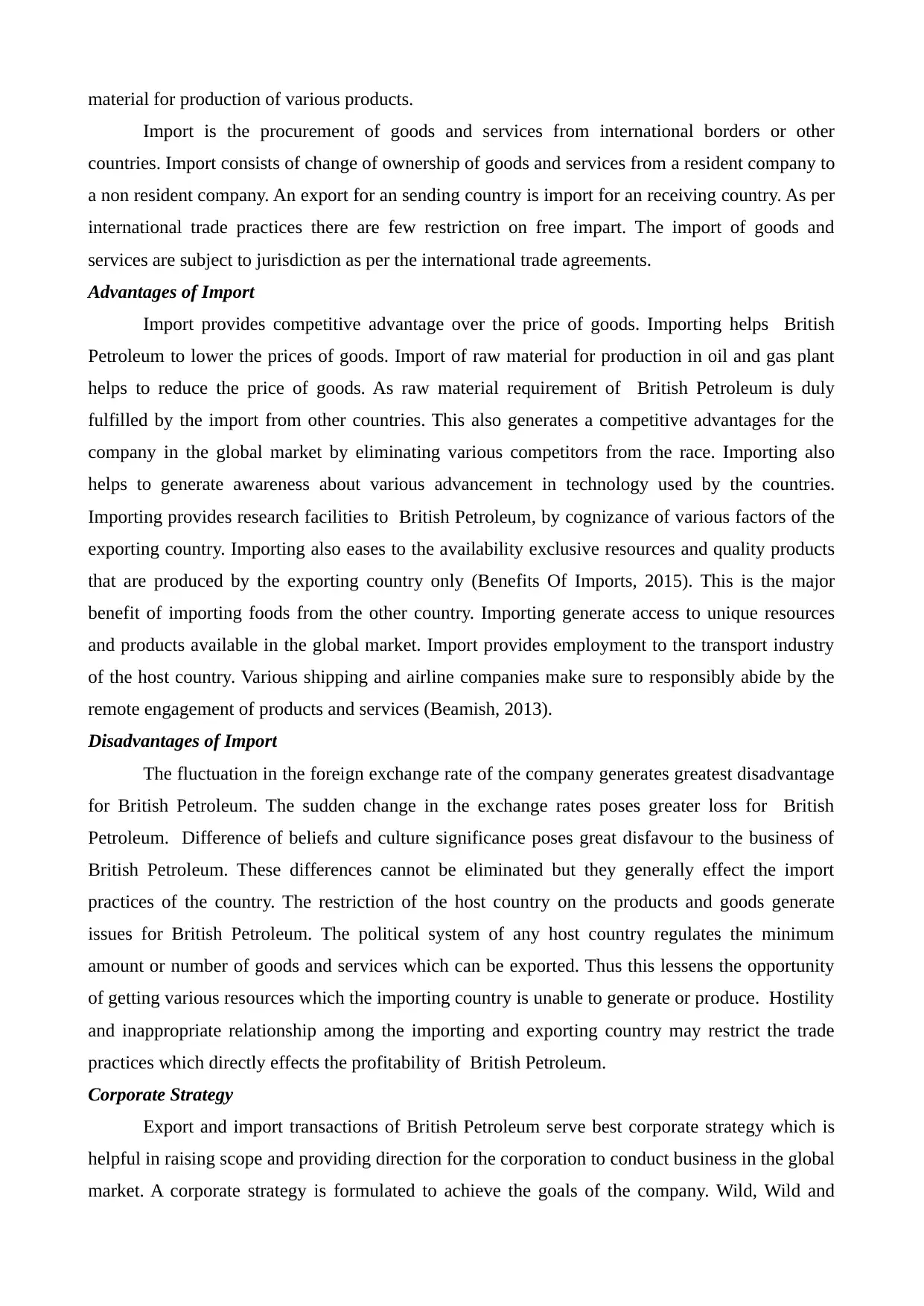
material for production of various products.
Import is the procurement of goods and services from international borders or other
countries. Import consists of change of ownership of goods and services from a resident company to
a non resident company. An export for an sending country is import for an receiving country. As per
international trade practices there are few restriction on free impart. The import of goods and
services are subject to jurisdiction as per the international trade agreements.
Advantages of Import
Import provides competitive advantage over the price of goods. Importing helps British
Petroleum to lower the prices of goods. Import of raw material for production in oil and gas plant
helps to reduce the price of goods. As raw material requirement of British Petroleum is duly
fulfilled by the import from other countries. This also generates a competitive advantages for the
company in the global market by eliminating various competitors from the race. Importing also
helps to generate awareness about various advancement in technology used by the countries.
Importing provides research facilities to British Petroleum, by cognizance of various factors of the
exporting country. Importing also eases to the availability exclusive resources and quality products
that are produced by the exporting country only (Benefits Of Imports, 2015). This is the major
benefit of importing foods from the other country. Importing generate access to unique resources
and products available in the global market. Import provides employment to the transport industry
of the host country. Various shipping and airline companies make sure to responsibly abide by the
remote engagement of products and services (Beamish, 2013).
Disadvantages of Import
The fluctuation in the foreign exchange rate of the company generates greatest disadvantage
for British Petroleum. The sudden change in the exchange rates poses greater loss for British
Petroleum. Difference of beliefs and culture significance poses great disfavour to the business of
British Petroleum. These differences cannot be eliminated but they generally effect the import
practices of the country. The restriction of the host country on the products and goods generate
issues for British Petroleum. The political system of any host country regulates the minimum
amount or number of goods and services which can be exported. Thus this lessens the opportunity
of getting various resources which the importing country is unable to generate or produce. Hostility
and inappropriate relationship among the importing and exporting country may restrict the trade
practices which directly effects the profitability of British Petroleum.
Corporate Strategy
Export and import transactions of British Petroleum serve best corporate strategy which is
helpful in raising scope and providing direction for the corporation to conduct business in the global
market. A corporate strategy is formulated to achieve the goals of the company. Wild, Wild and
Import is the procurement of goods and services from international borders or other
countries. Import consists of change of ownership of goods and services from a resident company to
a non resident company. An export for an sending country is import for an receiving country. As per
international trade practices there are few restriction on free impart. The import of goods and
services are subject to jurisdiction as per the international trade agreements.
Advantages of Import
Import provides competitive advantage over the price of goods. Importing helps British
Petroleum to lower the prices of goods. Import of raw material for production in oil and gas plant
helps to reduce the price of goods. As raw material requirement of British Petroleum is duly
fulfilled by the import from other countries. This also generates a competitive advantages for the
company in the global market by eliminating various competitors from the race. Importing also
helps to generate awareness about various advancement in technology used by the countries.
Importing provides research facilities to British Petroleum, by cognizance of various factors of the
exporting country. Importing also eases to the availability exclusive resources and quality products
that are produced by the exporting country only (Benefits Of Imports, 2015). This is the major
benefit of importing foods from the other country. Importing generate access to unique resources
and products available in the global market. Import provides employment to the transport industry
of the host country. Various shipping and airline companies make sure to responsibly abide by the
remote engagement of products and services (Beamish, 2013).
Disadvantages of Import
The fluctuation in the foreign exchange rate of the company generates greatest disadvantage
for British Petroleum. The sudden change in the exchange rates poses greater loss for British
Petroleum. Difference of beliefs and culture significance poses great disfavour to the business of
British Petroleum. These differences cannot be eliminated but they generally effect the import
practices of the country. The restriction of the host country on the products and goods generate
issues for British Petroleum. The political system of any host country regulates the minimum
amount or number of goods and services which can be exported. Thus this lessens the opportunity
of getting various resources which the importing country is unable to generate or produce. Hostility
and inappropriate relationship among the importing and exporting country may restrict the trade
practices which directly effects the profitability of British Petroleum.
Corporate Strategy
Export and import transactions of British Petroleum serve best corporate strategy which is
helpful in raising scope and providing direction for the corporation to conduct business in the global
market. A corporate strategy is formulated to achieve the goals of the company. Wild, Wild and
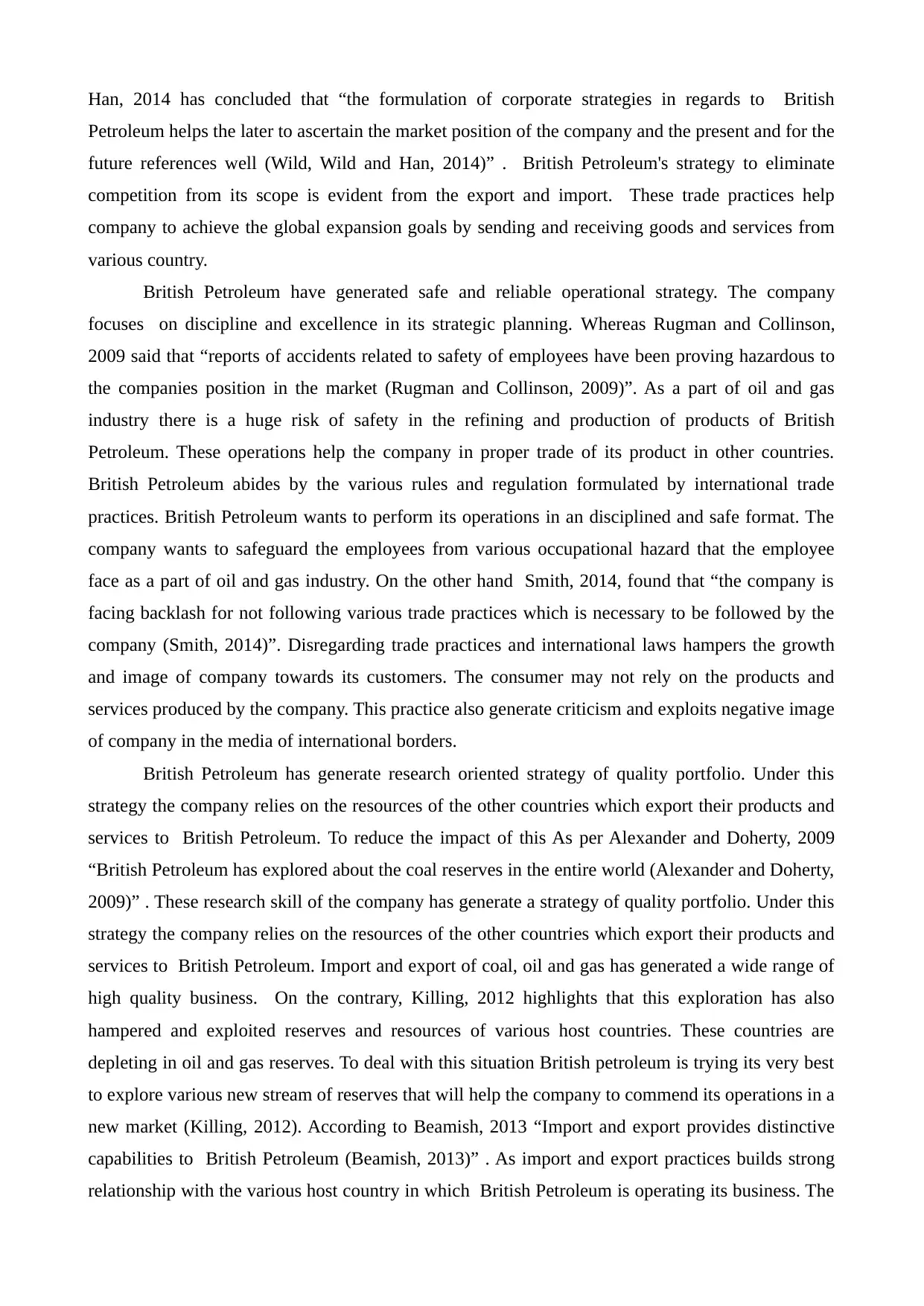
Han, 2014 has concluded that “the formulation of corporate strategies in regards to British
Petroleum helps the later to ascertain the market position of the company and the present and for the
future references well (Wild, Wild and Han, 2014)” . British Petroleum's strategy to eliminate
competition from its scope is evident from the export and import. These trade practices help
company to achieve the global expansion goals by sending and receiving goods and services from
various country.
British Petroleum have generated safe and reliable operational strategy. The company
focuses on discipline and excellence in its strategic planning. Whereas Rugman and Collinson,
2009 said that “reports of accidents related to safety of employees have been proving hazardous to
the companies position in the market (Rugman and Collinson, 2009)”. As a part of oil and gas
industry there is a huge risk of safety in the refining and production of products of British
Petroleum. These operations help the company in proper trade of its product in other countries.
British Petroleum abides by the various rules and regulation formulated by international trade
practices. British Petroleum wants to perform its operations in an disciplined and safe format. The
company wants to safeguard the employees from various occupational hazard that the employee
face as a part of oil and gas industry. On the other hand Smith, 2014, found that “the company is
facing backlash for not following various trade practices which is necessary to be followed by the
company (Smith, 2014)”. Disregarding trade practices and international laws hampers the growth
and image of company towards its customers. The consumer may not rely on the products and
services produced by the company. This practice also generate criticism and exploits negative image
of company in the media of international borders.
British Petroleum has generate research oriented strategy of quality portfolio. Under this
strategy the company relies on the resources of the other countries which export their products and
services to British Petroleum. To reduce the impact of this As per Alexander and Doherty, 2009
“British Petroleum has explored about the coal reserves in the entire world (Alexander and Doherty,
2009)” . These research skill of the company has generate a strategy of quality portfolio. Under this
strategy the company relies on the resources of the other countries which export their products and
services to British Petroleum. Import and export of coal, oil and gas has generated a wide range of
high quality business. On the contrary, Killing, 2012 highlights that this exploration has also
hampered and exploited reserves and resources of various host countries. These countries are
depleting in oil and gas reserves. To deal with this situation British petroleum is trying its very best
to explore various new stream of reserves that will help the company to commend its operations in a
new market (Killing, 2012). According to Beamish, 2013 “Import and export provides distinctive
capabilities to British Petroleum (Beamish, 2013)” . As import and export practices builds strong
relationship with the various host country in which British Petroleum is operating its business. The
Petroleum helps the later to ascertain the market position of the company and the present and for the
future references well (Wild, Wild and Han, 2014)” . British Petroleum's strategy to eliminate
competition from its scope is evident from the export and import. These trade practices help
company to achieve the global expansion goals by sending and receiving goods and services from
various country.
British Petroleum have generated safe and reliable operational strategy. The company
focuses on discipline and excellence in its strategic planning. Whereas Rugman and Collinson,
2009 said that “reports of accidents related to safety of employees have been proving hazardous to
the companies position in the market (Rugman and Collinson, 2009)”. As a part of oil and gas
industry there is a huge risk of safety in the refining and production of products of British
Petroleum. These operations help the company in proper trade of its product in other countries.
British Petroleum abides by the various rules and regulation formulated by international trade
practices. British Petroleum wants to perform its operations in an disciplined and safe format. The
company wants to safeguard the employees from various occupational hazard that the employee
face as a part of oil and gas industry. On the other hand Smith, 2014, found that “the company is
facing backlash for not following various trade practices which is necessary to be followed by the
company (Smith, 2014)”. Disregarding trade practices and international laws hampers the growth
and image of company towards its customers. The consumer may not rely on the products and
services produced by the company. This practice also generate criticism and exploits negative image
of company in the media of international borders.
British Petroleum has generate research oriented strategy of quality portfolio. Under this
strategy the company relies on the resources of the other countries which export their products and
services to British Petroleum. To reduce the impact of this As per Alexander and Doherty, 2009
“British Petroleum has explored about the coal reserves in the entire world (Alexander and Doherty,
2009)” . These research skill of the company has generate a strategy of quality portfolio. Under this
strategy the company relies on the resources of the other countries which export their products and
services to British Petroleum. Import and export of coal, oil and gas has generated a wide range of
high quality business. On the contrary, Killing, 2012 highlights that this exploration has also
hampered and exploited reserves and resources of various host countries. These countries are
depleting in oil and gas reserves. To deal with this situation British petroleum is trying its very best
to explore various new stream of reserves that will help the company to commend its operations in a
new market (Killing, 2012). According to Beamish, 2013 “Import and export provides distinctive
capabilities to British Petroleum (Beamish, 2013)” . As import and export practices builds strong
relationship with the various host country in which British Petroleum is operating its business. The
⊘ This is a preview!⊘
Do you want full access?
Subscribe today to unlock all pages.

Trusted by 1+ million students worldwide
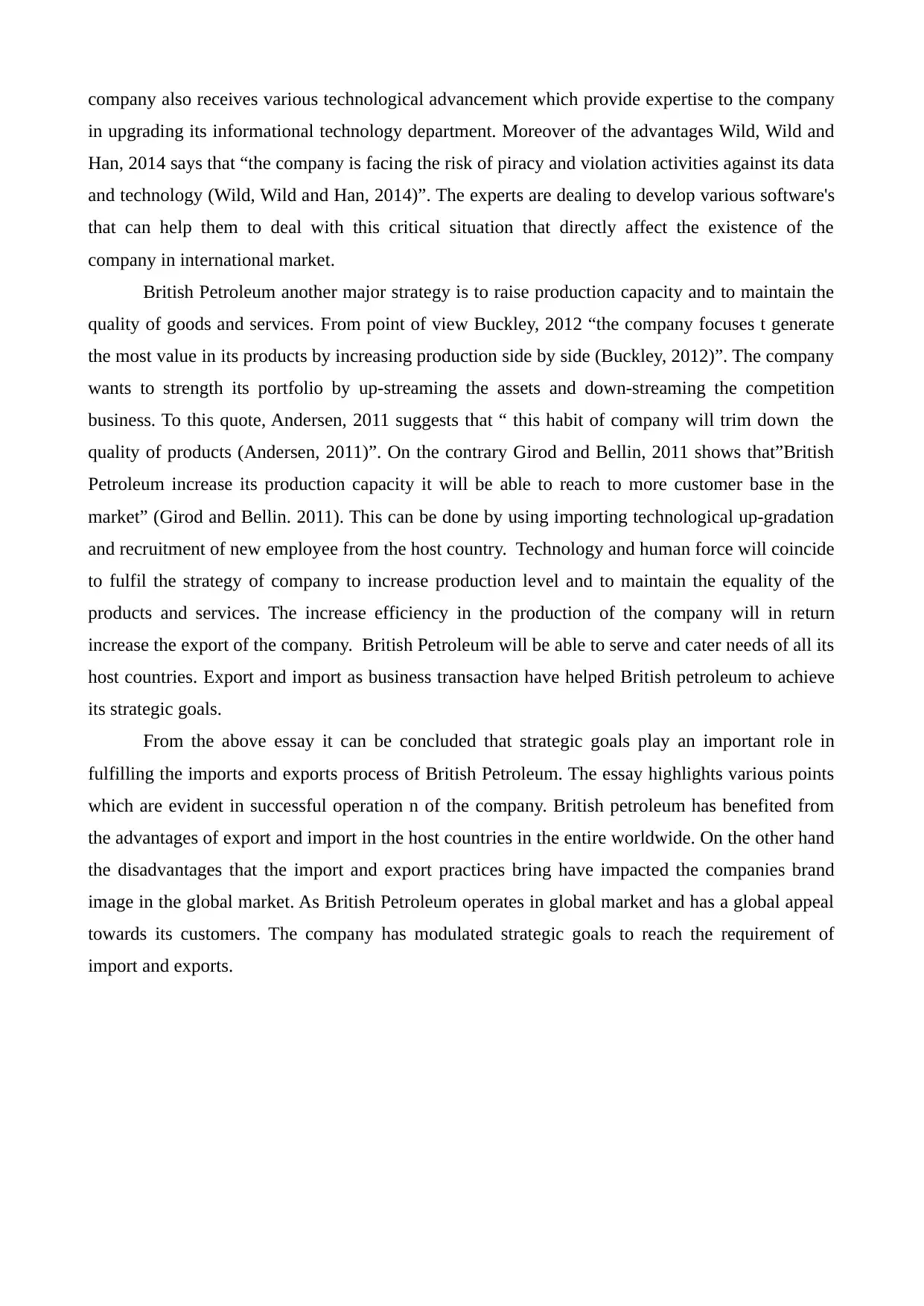
company also receives various technological advancement which provide expertise to the company
in upgrading its informational technology department. Moreover of the advantages Wild, Wild and
Han, 2014 says that “the company is facing the risk of piracy and violation activities against its data
and technology (Wild, Wild and Han, 2014)”. The experts are dealing to develop various software's
that can help them to deal with this critical situation that directly affect the existence of the
company in international market.
British Petroleum another major strategy is to raise production capacity and to maintain the
quality of goods and services. From point of view Buckley, 2012 “the company focuses t generate
the most value in its products by increasing production side by side (Buckley, 2012)”. The company
wants to strength its portfolio by up-streaming the assets and down-streaming the competition
business. To this quote, Andersen, 2011 suggests that “ this habit of company will trim down the
quality of products (Andersen, 2011)”. On the contrary Girod and Bellin, 2011 shows that”British
Petroleum increase its production capacity it will be able to reach to more customer base in the
market” (Girod and Bellin. 2011). This can be done by using importing technological up-gradation
and recruitment of new employee from the host country. Technology and human force will coincide
to fulfil the strategy of company to increase production level and to maintain the equality of the
products and services. The increase efficiency in the production of the company will in return
increase the export of the company. British Petroleum will be able to serve and cater needs of all its
host countries. Export and import as business transaction have helped British petroleum to achieve
its strategic goals.
From the above essay it can be concluded that strategic goals play an important role in
fulfilling the imports and exports process of British Petroleum. The essay highlights various points
which are evident in successful operation n of the company. British petroleum has benefited from
the advantages of export and import in the host countries in the entire worldwide. On the other hand
the disadvantages that the import and export practices bring have impacted the companies brand
image in the global market. As British Petroleum operates in global market and has a global appeal
towards its customers. The company has modulated strategic goals to reach the requirement of
import and exports.
in upgrading its informational technology department. Moreover of the advantages Wild, Wild and
Han, 2014 says that “the company is facing the risk of piracy and violation activities against its data
and technology (Wild, Wild and Han, 2014)”. The experts are dealing to develop various software's
that can help them to deal with this critical situation that directly affect the existence of the
company in international market.
British Petroleum another major strategy is to raise production capacity and to maintain the
quality of goods and services. From point of view Buckley, 2012 “the company focuses t generate
the most value in its products by increasing production side by side (Buckley, 2012)”. The company
wants to strength its portfolio by up-streaming the assets and down-streaming the competition
business. To this quote, Andersen, 2011 suggests that “ this habit of company will trim down the
quality of products (Andersen, 2011)”. On the contrary Girod and Bellin, 2011 shows that”British
Petroleum increase its production capacity it will be able to reach to more customer base in the
market” (Girod and Bellin. 2011). This can be done by using importing technological up-gradation
and recruitment of new employee from the host country. Technology and human force will coincide
to fulfil the strategy of company to increase production level and to maintain the equality of the
products and services. The increase efficiency in the production of the company will in return
increase the export of the company. British Petroleum will be able to serve and cater needs of all its
host countries. Export and import as business transaction have helped British petroleum to achieve
its strategic goals.
From the above essay it can be concluded that strategic goals play an important role in
fulfilling the imports and exports process of British Petroleum. The essay highlights various points
which are evident in successful operation n of the company. British petroleum has benefited from
the advantages of export and import in the host countries in the entire worldwide. On the other hand
the disadvantages that the import and export practices bring have impacted the companies brand
image in the global market. As British Petroleum operates in global market and has a global appeal
towards its customers. The company has modulated strategic goals to reach the requirement of
import and exports.
Paraphrase This Document
Need a fresh take? Get an instant paraphrase of this document with our AI Paraphraser
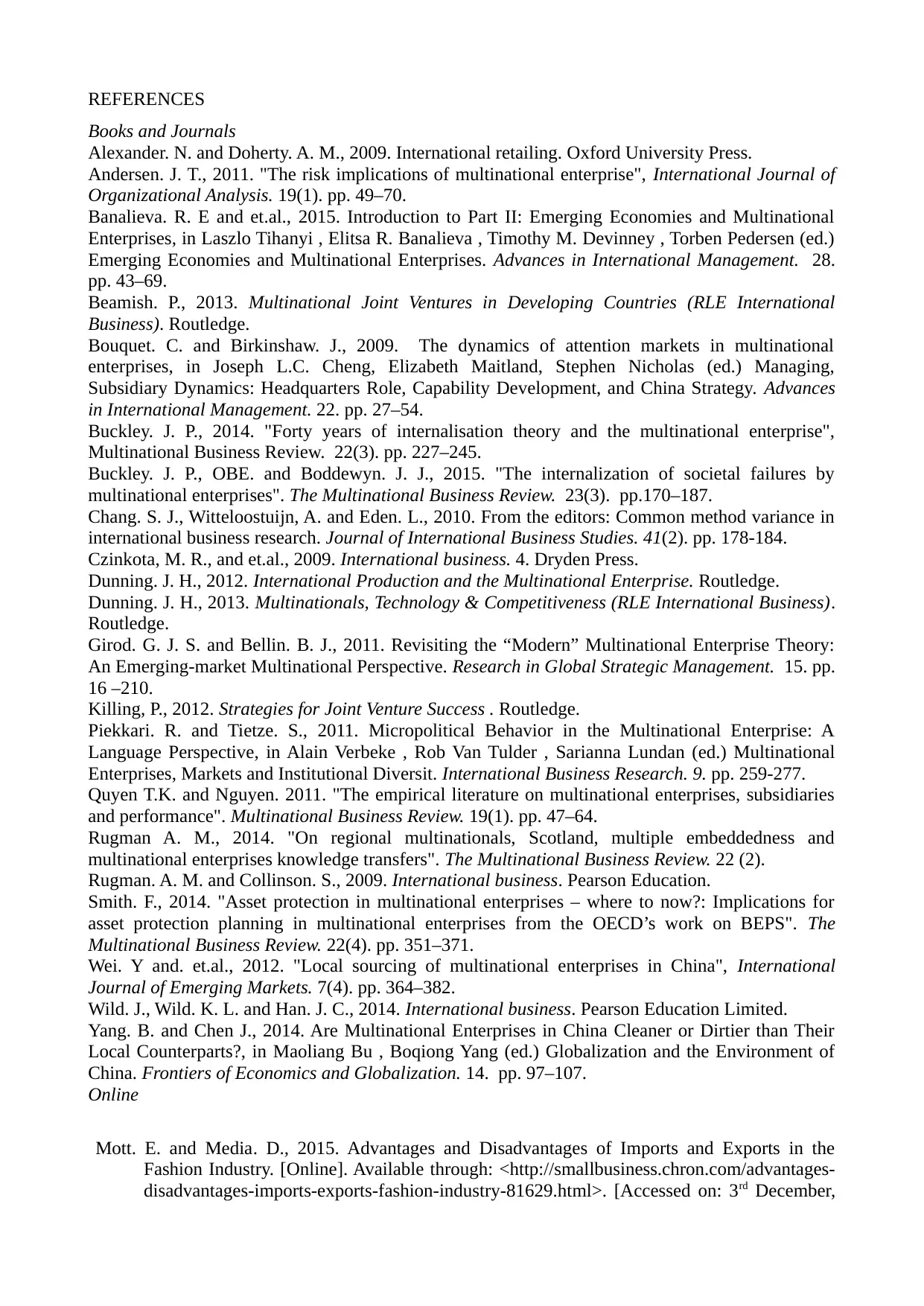
REFERENCES
Books and Journals
Alexander. N. and Doherty. A. M., 2009. International retailing. Oxford University Press.
Andersen. J. T., 2011. "The risk implications of multinational enterprise", International Journal of
Organizational Analysis. 19(1). pp. 49–70.
Banalieva. R. E and et.al., 2015. Introduction to Part II: Emerging Economies and Multinational
Enterprises, in Laszlo Tihanyi , Elitsa R. Banalieva , Timothy M. Devinney , Torben Pedersen (ed.)
Emerging Economies and Multinational Enterprises. Advances in International Management. 28.
pp. 43–69.
Beamish. P., 2013. Multinational Joint Ventures in Developing Countries (RLE International
Business). Routledge.
Bouquet. C. and Birkinshaw. J., 2009. The dynamics of attention markets in multinational
enterprises, in Joseph L.C. Cheng, Elizabeth Maitland, Stephen Nicholas (ed.) Managing,
Subsidiary Dynamics: Headquarters Role, Capability Development, and China Strategy. Advances
in International Management. 22. pp. 27–54.
Buckley. J. P., 2014. "Forty years of internalisation theory and the multinational enterprise",
Multinational Business Review. 22(3). pp. 227–245.
Buckley. J. P., OBE. and Boddewyn. J. J., 2015. "The internalization of societal failures by
multinational enterprises". The Multinational Business Review. 23(3). pp.170–187.
Chang. S. J., Witteloostuijn, A. and Eden. L., 2010. From the editors: Common method variance in
international business research. Journal of International Business Studies. 41(2). pp. 178-184.
Czinkota, M. R., and et.al., 2009. International business. 4. Dryden Press.
Dunning. J. H., 2012. International Production and the Multinational Enterprise. Routledge.
Dunning. J. H., 2013. Multinationals, Technology & Competitiveness (RLE International Business).
Routledge.
Girod. G. J. S. and Bellin. B. J., 2011. Revisiting the “Modern” Multinational Enterprise Theory:
An Emerging-market Multinational Perspective. Research in Global Strategic Management. 15. pp.
16 –210.
Killing, P., 2012. Strategies for Joint Venture Success . Routledge.
Piekkari. R. and Tietze. S., 2011. Micropolitical Behavior in the Multinational Enterprise: A
Language Perspective, in Alain Verbeke , Rob Van Tulder , Sarianna Lundan (ed.) Multinational
Enterprises, Markets and Institutional Diversit. International Business Research. 9. pp. 259-277.
Quyen T.K. and Nguyen. 2011. "The empirical literature on multinational enterprises, subsidiaries
and performance". Multinational Business Review. 19(1). pp. 47–64.
Rugman A. M., 2014. "On regional multinationals, Scotland, multiple embeddedness and
multinational enterprises knowledge transfers". The Multinational Business Review. 22 (2).
Rugman. A. M. and Collinson. S., 2009. International business. Pearson Education.
Smith. F., 2014. "Asset protection in multinational enterprises – where to now?: Implications for
asset protection planning in multinational enterprises from the OECD’s work on BEPS". The
Multinational Business Review. 22(4). pp. 351–371.
Wei. Y and. et.al., 2012. "Local sourcing of multinational enterprises in China", International
Journal of Emerging Markets. 7(4). pp. 364–382.
Wild. J., Wild. K. L. and Han. J. C., 2014. International business. Pearson Education Limited.
Yang. B. and Chen J., 2014. Are Multinational Enterprises in China Cleaner or Dirtier than Their
Local Counterparts?, in Maoliang Bu , Boqiong Yang (ed.) Globalization and the Environment of
China. Frontiers of Economics and Globalization. 14. pp. 97–107.
Online
Mott. E. and Media. D., 2015. Advantages and Disadvantages of Imports and Exports in the
Fashion Industry. [Online]. Available through: <http://smallbusiness.chron.com/advantages-
disadvantages-imports-exports-fashion-industry-81629.html>. [Accessed on: 3rd December,
Books and Journals
Alexander. N. and Doherty. A. M., 2009. International retailing. Oxford University Press.
Andersen. J. T., 2011. "The risk implications of multinational enterprise", International Journal of
Organizational Analysis. 19(1). pp. 49–70.
Banalieva. R. E and et.al., 2015. Introduction to Part II: Emerging Economies and Multinational
Enterprises, in Laszlo Tihanyi , Elitsa R. Banalieva , Timothy M. Devinney , Torben Pedersen (ed.)
Emerging Economies and Multinational Enterprises. Advances in International Management. 28.
pp. 43–69.
Beamish. P., 2013. Multinational Joint Ventures in Developing Countries (RLE International
Business). Routledge.
Bouquet. C. and Birkinshaw. J., 2009. The dynamics of attention markets in multinational
enterprises, in Joseph L.C. Cheng, Elizabeth Maitland, Stephen Nicholas (ed.) Managing,
Subsidiary Dynamics: Headquarters Role, Capability Development, and China Strategy. Advances
in International Management. 22. pp. 27–54.
Buckley. J. P., 2014. "Forty years of internalisation theory and the multinational enterprise",
Multinational Business Review. 22(3). pp. 227–245.
Buckley. J. P., OBE. and Boddewyn. J. J., 2015. "The internalization of societal failures by
multinational enterprises". The Multinational Business Review. 23(3). pp.170–187.
Chang. S. J., Witteloostuijn, A. and Eden. L., 2010. From the editors: Common method variance in
international business research. Journal of International Business Studies. 41(2). pp. 178-184.
Czinkota, M. R., and et.al., 2009. International business. 4. Dryden Press.
Dunning. J. H., 2012. International Production and the Multinational Enterprise. Routledge.
Dunning. J. H., 2013. Multinationals, Technology & Competitiveness (RLE International Business).
Routledge.
Girod. G. J. S. and Bellin. B. J., 2011. Revisiting the “Modern” Multinational Enterprise Theory:
An Emerging-market Multinational Perspective. Research in Global Strategic Management. 15. pp.
16 –210.
Killing, P., 2012. Strategies for Joint Venture Success . Routledge.
Piekkari. R. and Tietze. S., 2011. Micropolitical Behavior in the Multinational Enterprise: A
Language Perspective, in Alain Verbeke , Rob Van Tulder , Sarianna Lundan (ed.) Multinational
Enterprises, Markets and Institutional Diversit. International Business Research. 9. pp. 259-277.
Quyen T.K. and Nguyen. 2011. "The empirical literature on multinational enterprises, subsidiaries
and performance". Multinational Business Review. 19(1). pp. 47–64.
Rugman A. M., 2014. "On regional multinationals, Scotland, multiple embeddedness and
multinational enterprises knowledge transfers". The Multinational Business Review. 22 (2).
Rugman. A. M. and Collinson. S., 2009. International business. Pearson Education.
Smith. F., 2014. "Asset protection in multinational enterprises – where to now?: Implications for
asset protection planning in multinational enterprises from the OECD’s work on BEPS". The
Multinational Business Review. 22(4). pp. 351–371.
Wei. Y and. et.al., 2012. "Local sourcing of multinational enterprises in China", International
Journal of Emerging Markets. 7(4). pp. 364–382.
Wild. J., Wild. K. L. and Han. J. C., 2014. International business. Pearson Education Limited.
Yang. B. and Chen J., 2014. Are Multinational Enterprises in China Cleaner or Dirtier than Their
Local Counterparts?, in Maoliang Bu , Boqiong Yang (ed.) Globalization and the Environment of
China. Frontiers of Economics and Globalization. 14. pp. 97–107.
Online
Mott. E. and Media. D., 2015. Advantages and Disadvantages of Imports and Exports in the
Fashion Industry. [Online]. Available through: <http://smallbusiness.chron.com/advantages-
disadvantages-imports-exports-fashion-industry-81629.html>. [Accessed on: 3rd December,
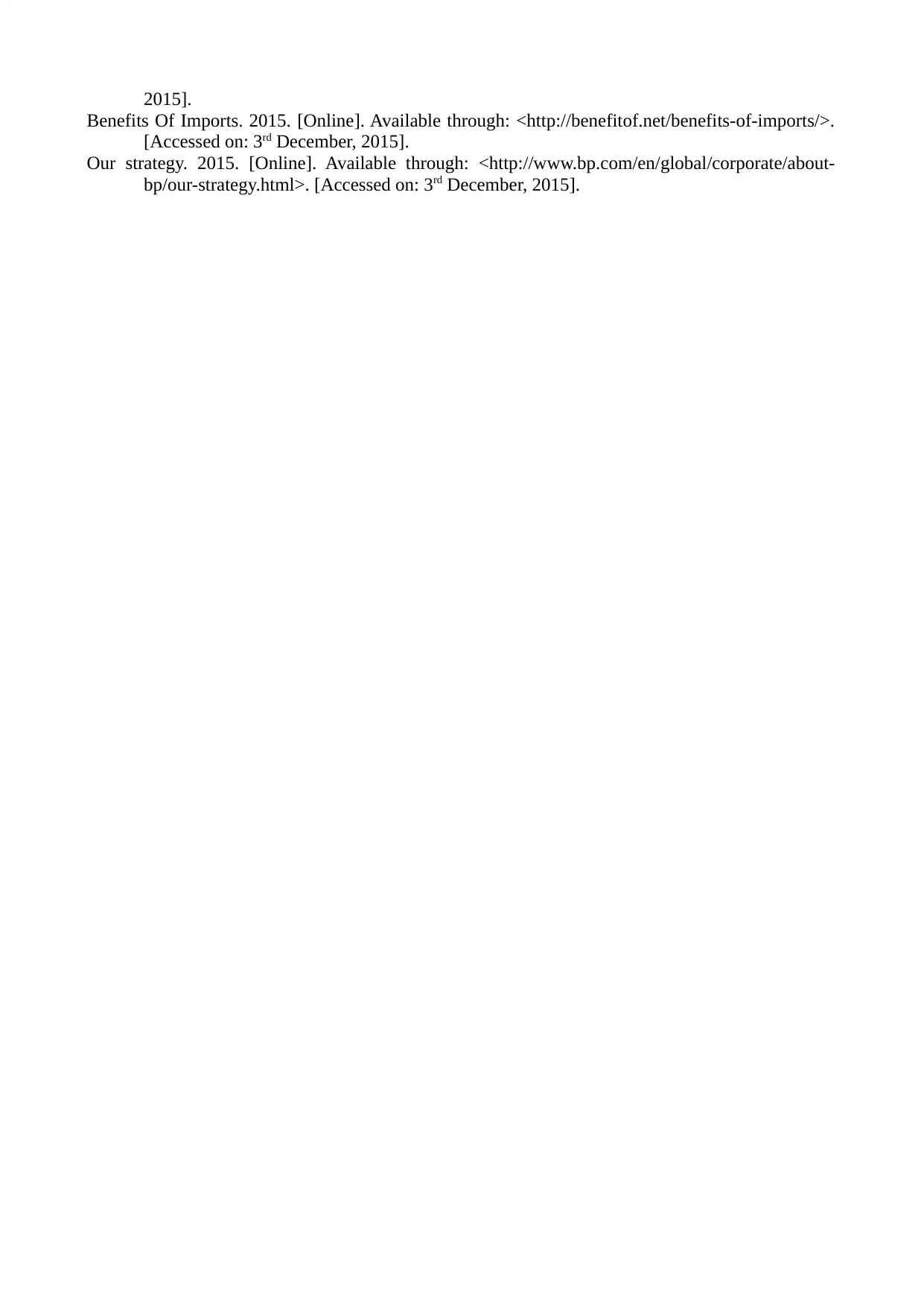
2015].
Benefits Of Imports. 2015. [Online]. Available through: <http://benefitof.net/benefits-of-imports/>.
[Accessed on: 3rd December, 2015].
Our strategy. 2015. [Online]. Available through: <http://www.bp.com/en/global/corporate/about-
bp/our-strategy.html>. [Accessed on: 3rd December, 2015].
Benefits Of Imports. 2015. [Online]. Available through: <http://benefitof.net/benefits-of-imports/>.
[Accessed on: 3rd December, 2015].
Our strategy. 2015. [Online]. Available through: <http://www.bp.com/en/global/corporate/about-
bp/our-strategy.html>. [Accessed on: 3rd December, 2015].
⊘ This is a preview!⊘
Do you want full access?
Subscribe today to unlock all pages.

Trusted by 1+ million students worldwide
1 out of 9
Related Documents
Your All-in-One AI-Powered Toolkit for Academic Success.
+13062052269
info@desklib.com
Available 24*7 on WhatsApp / Email
![[object Object]](/_next/static/media/star-bottom.7253800d.svg)
Unlock your academic potential
Copyright © 2020–2026 A2Z Services. All Rights Reserved. Developed and managed by ZUCOL.





